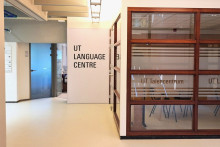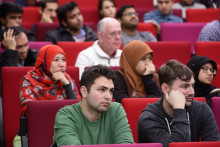Over twenty UT staff members signed up to join the conversation in the most recent afternoon of participation. In the Noordhorst, the attendees joined one of the round tables, each with a specific theme: HR, communication, campus life/UT community and policy/management/participation.
At the table related to the campus life and UT community, a lively discussion took place regarding parallel bilingualism, which is the name for the intended language of instruction policy. The Executive Board is opting for two languages of instruction: English and Dutch. This plan received a positive advice from the University Council last September.
Manifestation
The Executive Board wants English to be used as the lingua franca (the common language used between people with different mother tongues) of science and as a shared language in the UT's international community. According to the UT, Dutch is the language of the region and the society in which the UT is embedded. Inclusion is and will remain the guiding principle. But how will this manifest itself in practice? That will be discussed in the coming months by the UT Language Centre's Working Group on Language Policy, among others. The session in the Noordhorst serves as a start.
Elections
Not before long, the outcome of the elections is discussed. How will it influence the language of instruction policy of the university? The winning party of the elections, the PVV, wants bachelor degrees to be taught in Dutch. NSC leader Pieter Omtzigt, whose party became the fourth largest, shares that vision. The VVD, which is now the third largest, is also in favour of international students having to learn Dutch.
New government
‘Should I worry about the result? As a foreigner, can I still stay here?,’ a staff member wonders aloud. ‘In the coming months, it is likely that decision are made by the new government on whether or not to introduce Dutch at universities. We should therefore make our voices heard now.’ The speaker cites the situation at universities in Denmark. ‘After a few years, they revoked the ban on English as the language of instruction. This is due to the rapid decline in the number of students. We should prevent a similar situation in the Netherlands.’
‘The UT is an English bubble’
One student deems that above all, we should stay practical. ‘It feels off to speak English compulsorily when you are aware that everyone in a group speaks the same language,’ she says. ‘Simply switch to English when at least one person in the group does not speak your language.’
Not fluent
Another employee deems that it is not surprising whatsoever that not everyone is equally fluent in English nor Dutch. In practice, the language barrier is easily overcome. ‘Almost everyone at the UT speaks English as their second language. Therefore, you are truly not the only one who doesn't speak it fluently. Personally, I don't speak Dutch. I often ask others to speak in English to me, which has always worked. That's how I can truly be part of a team.’
Coffee machine
Other opinions are voiced as well. ‘The UT is an English bubble. I never get the chance to learn Dutch,’ a bachelor student notes. ‘It is almost impossible to learn Dutch besides a study. I am therefore open to be addressed in Dutch when making small talk at the coffee machine. That way I also learn something new. But in the lecture halls, English should persist. All students speak that language.’
The outcomes of the event will be translated into a proposal which will be discussed by the Executive Board just before the winter break.
To be continued. Or in other words: Wordt vervolgd.








